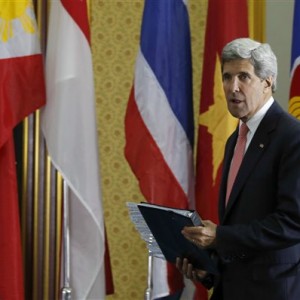
US Secretary of State John Kerry arrives for a press conference at the Asean meeting in the International Conference Center in Bandar Seri Begawan, Brunei, Monday. AP
BANDAR SERI BEGAWAN—Asia-Pacific security talks opened Tuesday with Beijing under pressure over its West Philippine Sea (South China Sea) claims while Washington and Moscow were to meet amid disagreements on Syria and their tug-of-war over US fugitive Edward Snowden.
The annual regional forum hosted this year by Brunei began a day after US Secretary of State John Kerry closed ranks with Southeast Asian nations in urging substantive talks on the disputed West Philippine Sea in comments targeted at Beijing.
Concerns have been rising that actions by China to increase its grip on disputed islets in the sea, a key corridor for regional and world trade, could lead to conflict with rival claimants.
On Sunday, the Philippines told a gathering of the 10-country Association of Southeast Asian Nations (Asean) that China was engaging in a military buildup at sea that threatened regional peace.
Asean has been pushing a reluctant China for talks on a set of rules governing conduct at sea meant to avert unilateral actions that could spark trouble.
“We very much hope to see progress on a substantive code of conduct to help ensure stability in this vital region,” Kerry told his Asean counterparts Monday.
On the final day of a flurry of back-to-back diplomatic events in the sultanate, Kerry also was to meet his Russian counterpart Sergei Lavrov.
Kerry said he would seek progress towards an elusive international conference to end Syria’s civil war.
Russia has backed Syrian President Bashar al-Assad in the more than two-year conflict that has claimed nearly 100,000 lives, while Washington has said it is boosting support for the rebel movement.
But their meeting takes place under a cloud spawned by the sensational case of Snowden, who has been in limbo for a week in a Moscow airport in a globe-circling asylum bid.
In the latest twist, Moscow revealed Snowden had applied for political asylum in Russia.
President Vladimir Putin had earlier said Snowden was welcome to stay.
“If he wants to remain here there is one condition — he should stop his work aimed at inflicting damage on our American partners no matter how strange this may sound coming from me,” Putin said.
Snowden had worked as a contractor for the US National Security Agency before his damaging leaks on a global US surveillance program began emerging in early June.
Kerry flew to Brunei from days of exhaustive talks in the Middle East aimed at restarting the Israeli-Palestinian peace process and straight into the Snowden controversy after German media reported some of the spying was targeted at European allies.
Kerry said EU foreign policy chief Catherine Ashton raised concerns about the reports when they met one-to-one in Brunei and the US diplomat said he would get back to her after looking into the reports.
France on Monday warned the allegations of US spying in Europe threatened talks on a crucial free trade pact, while US President Barack Obama also vowed to respond to Europe’s concerns once he had all the facts.
China claims virtually all of the West Philippine Sea and has long resisted moves to talk with the Asean grouping as a whole, reluctant to cede any ground on its claims.
On Sunday in Brunei, it agreed with Asean to begin discussing a code of conduct, but a senior US government official played down the move as a bid to deflect criticism.
The official, speaking on condition of anonymity, said “it’s not enough to simply promise some form of talks in the run-up to a multilateral meeting as a way of abating criticism and creating the appearance of progress.”
China was sending a conflicting message by sending large numbers of fishing or law enforcement vessels to hotly disputed areas, the official added, calling such behavior “highly problematic and destabilizing”.
But Kerry said after a meeting with his Chinese counterpart Wang Yi that the two Pacific powers were united, along with Japan and South Korea, in their opposition to North Korea’s nuclear drive.

